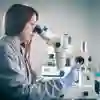
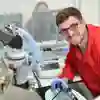
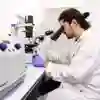
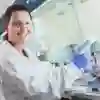
Develop the knowledge and skills to drive innovation that saves lives on our Biomedical Science degree.
You’ll gain a deep understanding of the human form and function in health and disease through supported, lab-based learning. And graduate ready for a variety of careers, including potentially life-saving work at the cutting edge of health research.
Our Biomedical Science degree is accredited by the Institute of Biomedical Science, so you can be confident that it meets the Health & Care Professional Council standards for biomedical scientists and is the first step of your journey to become a registered biomedical scientist.
About this course
Our Institute of Biomedical Science accredited programme is designed in collaboration with Hull University Teaching Hospitals NHS Trust. With major input from NHS professionals, your course is guaranteed real-world relevance and authenticity.
Biomedical science applies biological principles to medicine. You’ll explore the physiological processes and functions of the human body to appreciate disease processes, diagnosis and treatment. And learn about the underlying causes of diseases and how this knowledge can be applied to diagnose and treat them.
Experience taught laboratory practicals across first and second year to master the key cellular, molecular, biochemical and microbiology techniques required to work in biomedical science pathology labs, industry and research. In the final year, you will undertake your own independent research project, allowing you to pull together the practical and academic skills you have learnt whilst on the programme.
You’ll benefit from the expertise of academics across the University and Hull York Medical School who are at the forefront of biomedical and health research – enabling you to develop the skills and expertise you need to become a leader in your chosen field of biomedical science.
Our strong links with industry mean you’ll get plenty of opportunities to refine the key skills demanded by employers. You’ll benefit from our excellent relationships with a range of organisations including local biotechnology companies, research units and local hospitals, and be at the forefront of advancements in healthcare and biomedical science.
After completion of this accredited programme, you will be in an ideal position to apply to be a Trainee Biomedical Scientist and complete your HCPC portfolio required to become a registered Biomedical Scientist.
Want to change lives? Let's start with yours.
Module options
Each year, you’ll study modules worth a certain number of credits, and you need 120 credits per year. Most modules are 20 credits – so you’ll study six modules each year. Some longer modules, such as a dissertation, are worth more. In these cases, you’ll study fewer modules - but the number of credits will always add up to 120. Some modules are compulsory, some are optional, so you can build a course that’s right for you.
Filters
Biochemistry
How does metabolism work? On this module, we illuminate the biochemical pathways that utilise sugars, proteins and lipids for energy generation by our cells and our bodies.
core
20 credits
Cell Structure and Function
Gain an understanding of cell organisation. In practical sessions you’ll learn how to use a light microscope, produce clear scientific figures and measure the size and number of cells.
core
20 credits
Molecular Biology and Genetics
DNA holds the secrets to life itself. Find out how key information is stored within the genes and the processes by which cells decode and interpret this genetic information to bring about essential cellular functions. In this module, you will discover how genetic information is inherited and what happens when things go wrong. Explore how molecular biology and genetic manipulation techniques allow us to uncover why genetic changes can lead to human disease and can potentially offer opportunities to diagnose and even treat them.
core
20 credits
Microbiology and Immunology
Examine the wonderful world of microorganisms and the defence against "bad" microbes (pathogens) by the intricate human immune system.
core
20 credits
Skills for Biomedical and Forensic Scientists
Discover and master the skills necessary to be a successful scientist. This module introduces you to essay writing and the scholarship skills you’ll use in your career.
core
20 credits
Human Physiology and Nutrition
Examine the key body systems including the circulatory, respiratory, nervous and gastrointestinal – in relation to metabolism, energy production and macronutrient function.
core
20 credits
Clinical Genetics
Our DNA makes each of us unique but even the smallest changes can have huge impacts on our health. In Clinical Genetics you will uncover the fascinating way that differences in our DNA can affect how cells function and can lead to increased risk of disease. Find out how understanding changes at the molecular level can help medical experts to diagnose, monitor and even treat disease and provide strategies that can be tailored for the individual patient.
core
20 credits
Blood Sciences
Blood science is the study of blood as a marker of disease. Through lab sessions and lectures, you'll explore clinical biochemistry, haematology and hospital transfusion practice.
core
20 credits
Clinical Microbiology and Immunology
Discover the world of clinically important microorganisms, how they drive disease and treatment options. Explore healthy and discorded human immunobiology, autoimmunity, allergies and transplantation.
core
20 credits
Our facilities

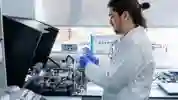


Watchlist
Dr Cheryl Walter
Course overview
1 min
Teaching Facilities
University life
2 mins
The Gold Standard for Teaching
University life
1 min
Life on campus
University life
2 mins
Featured academics
Our world-leading academics specialise in areas including cancer imaging, cardiovascular, haemostasis, diabetes, metabolism, respiratory and wound healing.
Researchers in our Biomedical Institute for Multimorbidity carry out work to understand the complex interplay between disease.

Dr Cheryl Walter
Senior lecturer in Biomedical Science
Cheryl holds a senior fellowship with Advance HE and enjoys developing educational resources and contributing to curriculum development and the scholarship of teaching and learning. Cheryl teaches across a range of programmes at varying levels.

Dr Dan Hampshire
Lecturer in Genetics
Dan’s research identifies genetic factors that contribute to our susceptibility to bleeding and thrombosis. And the role these can play in determining clinical outcomes for patients with acute coronary syndromes following treatment.
Entry Requirements
What do I need?
When it comes to applying to university, you'll need a certain number of UCAS points. Different qualifications and grades are worth a different amount of points. For this course, you'll need 120 UCAS points.
At least 80 points must come from A levels, BTEC, or other equivalent qualifications.
We consider experience and qualifications from the UK and worldwide which may not exactly match the combinations above.
But it's not just about the grades - we'll look at your whole application. We want to know what makes you tick, and about your previous experience, so make sure that you complete your personal statement.
Have questions? Our admissions team will be happy to help.
Typical offer
120 UCAS points
A levels
BBB
BTEC
DDM
Fees & Funding
How much is it?
For UK students, our standard course fee is £9,535 per year. Keep in mind that some courses are longer - for example, spending your third year abroad will make your degree four years in total.
If you choose to study a foundation year as part of your course, the fee is £9,535.
Thinking about a year in industry? This is £1,907 for UK students.
How do I pay for it?
You can take out a tuition fee loan to cover the full cost of your course. Once you’ve successfully applied for this, you don’t need to do anything else – the money is sent straight to us.
You can also take out a maintenance loan of up to £10,544 a year to cover your living costs, depending on your household income.
Remember, you won’t start paying your loans back until you’ve left university and earn more than £25,000 per year.
See our full fees and funding information for more details and to find out what support we can offer.
Standard Tuition Fee
£9,535 / year
The amount you pay may increase each year, in line with inflation - but capped to the Retail Price Index.

Future prospects
A Biomedical Science degree from Hull opens doors to a career in laboratory science and beyond. You could go on to work at the cutting edge of research helping to diagnose and treat diseases.
You’ll be eligible to work in academic research, the health service, medical institutions and education.
Our graduates have gone on to roles including, biomedical scientist, forensic scientist, biotechnologist, toxicologist, healthcare scientist, and medical research scientist – with a diverse range of employers including careers with employers such as ConocoPhillips, Reckitt, Smith & Nephew, the Civil Service, pharmacies, independent diagnostic and quality control testing laboratories and the NHS.
Become part of the next generation of futuremakers
Like what you’ve seen? Then it’s time to apply.
The standard way to apply is through UCAS. This will give you the chance to showcase your skills, qualities and passion for the subject, as well as providing us with your academic qualifications.
Not ready to apply yet?
Visit our next Open Day, and see all that Hull has to offer for yourself. Talk to our lecturers about your subject, find out what university is really like from our current students, and take a tour of our beautiful campus and amazing facilities.
You may also be interested in...
98% employability (Centre for Biomedicine) UK domicile full-time first degree leavers; Higher Education Graduate Outcomes statistics, for the academic year 2022/23, published by the Higher Education Statistics Agency June 2025.
Biomedical Science is ranked 2nd for Teaching Satisfaction. Guardian University Rankings 2025.
Subjects allied to medicine: Ranked 10th in the UK for Teaching Quality. The Times and Sunday Times Good University Guide 2026.
All modules on this course page are subject to availability and this list may change at any time.